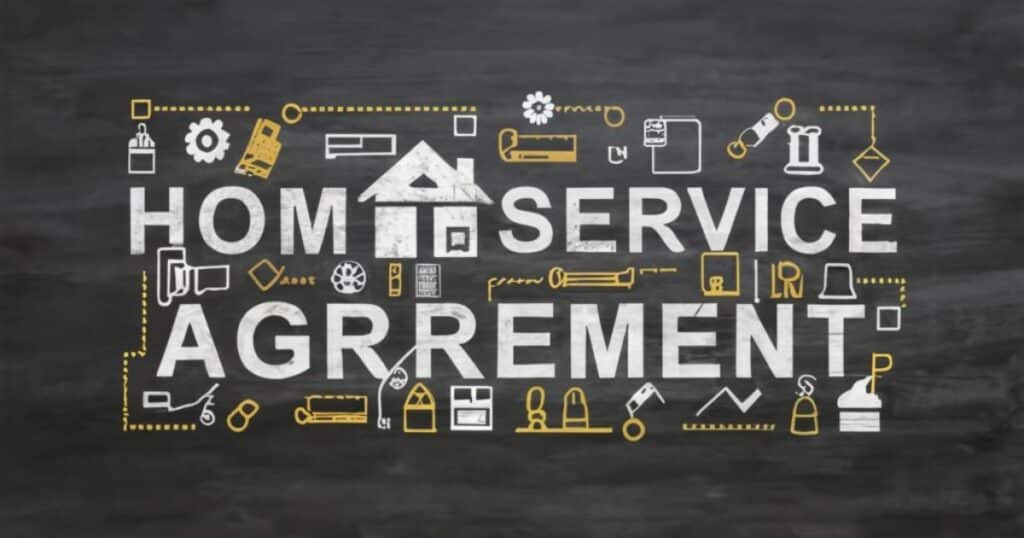A home service agreement program is a deal you make with a company. They fix things in your house when they break. You pay them a fee each month or year. It helps you avoid big repair bills.
Want to keep your home running smoothly? A home service agreement program is the key! It’s like having a superhero for your house. They fix problems quickly and save you money. Say goodbye to worries about repairs!
How a Home Service Agreement Program Works
A Home Service Agreement Program works like having a buddy for your house. First, you sign up with a company. Then, you pay them a fee each month or year. When something breaks in your home, you call them. They send a person to fix it for you. It’s easy and saves you from big repair bills!
The company’s workers are like fix-it superheroes. They come to your house and make everything better. You can relax knowing your home is in good hands. That’s how a Home Service Agreement Program works!
What is a Home Warranty Service Agreement?
A Home Warranty Service Agreement is like a promise to take care of your home. You pay a fee to a company, and they promise to fix things if they break. It’s like having insurance for your appliances and systems. When something goes wrong, you call the company, and they send someone to repair it.

This agreement covers things like your fridge, oven, plumbing, and electrical systems. It’s helpful because it saves you money on unexpected repairs. With a Home Warranty Service Agreement, you can relax knowing your home is protected.
How is a home warranty different from a manufacturer’s warranty?
A home warranty is different from a manufacturer’s warranty in several ways.
- Coverage: A home warranty covers various appliances and systems in your home, such as HVAC, plumbing, and electrical, regardless of their age or brand.
- Duration: A home warranty typically lasts for a set period, usually one year, and can be renewed annually, while a manufacturer’s warranty is usually provided by the manufacturer for a specific duration after the purchase of a new product.
- Scope: A home warranty covers repairs and replacements due to normal wear and tear, while a manufacturer’s warranty usually covers defects in materials and workmanship.
- Cost: A home warranty requires a fee paid either monthly or annually, whereas a manufacturer’s warranty is often included in the purchase price of a new product.
What Does a Home Warranty Service Agreement cover?
A Home Warranty Service Agreement covers many things in your home that can break or stop working. It includes appliances like refrigerators, stoves, and dishwashers. It also covers essential systems like heating, air conditioning, and plumbing. If any of these things have problems, the agreement helps pay for repairs or replacements.
The agreement protects you from unexpected expenses when things go wrong. It gives you peace of mind knowing that you won’t have to worry about big repair bills. With a Home Warranty Service Agreement, you can relax and enjoy your home without stress.
What may not be covered by a Home Warranty Service Agreement
- Pre-existing conditions: Problems that existed before the agreement started may not be covered.
- Cosmetic damage: Minor scratches, dents, or other cosmetic issues may not be included.
- Negligence or misuse: If the issue is due to neglect or improper use, it might not be covered.
- Certain components: Some parts of appliances or systems may not be covered, so it’s essential to check the terms of the agreement carefully.
Pros and cons of a Home Warranty Service Agreement
Pros of a Home Warranty Service Agreement:
- Protection: Provides coverage for unexpected repairs or replacements of appliances and systems in your home.
- Peace of Mind: Offers reassurance knowing that you won’t face large repair bills for covered items.
- Convenience: Simplifies the process of arranging and paying for repairs, often with a single phone call.
- Budget-friendly: Helps manage household expenses by spreading the cost of repairs over time.
Cons of a Home Warranty Service Agreement:
- Limited Coverage: This may not cover all appliances, systems, or types of damage, leading to potential gaps in protection.
- Service Limitations: Depending on the provider and plan, there may be restrictions on the types of repairs or the choice of service providers.
- Cost: Monthly or annual fees can add up over time, especially if you don’t end up using the warranty frequently.
- Exclusions and Conditions: Certain conditions, such as pre-existing issues or neglect, may void coverage for specific repairs.
Basic Features
Basic features are the essential parts or characteristics of something. They help identify what something is or how it works. Understanding basic features is important for using or explaining something effectively.

Eligibility
Eligibility refers to meeting the requirements or qualifications to participate in something. It determines who is allowed to access certain benefits, services, or opportunities. Meeting eligibility criteria is often necessary to receive specific privileges or assistance.
Transferability
Transferability refers to the ability to move or pass something from one person, place, or situation to another. It involves the process of transferring ownership, rights, or responsibilities. Transferability allows for the exchange or relocation of resources, assets, or agreements between parties.
Pre-Existing Conditions
Pre-existing conditions are health issues or medical conditions that a person has before obtaining health insurance or entering into a contract. They can include chronic illnesses, injuries, or diseases. Insurance companies may impose limitations or exclusions on coverage for pre-existing conditions to manage risk and costs.
Recommended Post: When Does Home Depot Offer 24-Month Financing?
Coverage for Existing Construction Homes
Coverage for existing construction homes refers to the extent of protection or insurance offered for houses that have already been built. It includes policies and agreements that address potential damages, repairs, or replacements for various components of the home, such as appliances, systems, and structural elements.
This coverage helps homeowners manage unexpected expenses related to maintenance and repairs in their existing homes.
Coverage Plans versus Homeowner’s Insurance
Coverage plans, like home warranties, focus on specific appliances and systems within your home. They provide repair or replacement coverage for items such as HVAC systems, electrical, and plumbing.
Homeowner’s insurance, on the other hand, offers broader coverage. It protects against various risks, including damage from natural disasters, theft, and liability for accidents on your property.
While coverage plans focus on specific components of your home, homeowner’s insurance provides more comprehensive protection, safeguarding your property and finances from a wider range of risks.
Key Benefits
Key Benefits of Coverage Plans:
- Peace of Mind: Provides reassurance knowing that your essential appliances and systems are covered against unexpected breakdowns.
- Cost Savings: Helps manage repair expenses by reducing the financial burden of unexpected repairs or replacements.
- Convenience: Simplifies the process of arranging repairs or replacements, often with a single point of contact.
- Predictability: Offers predictable costs with fixed monthly or annual fees, making budgeting easier.
- Extended Lifespan: Encourages regular maintenance and timely repairs, potentially prolonging the lifespan of appliances and systems.
- Peace of Mind: You feel calm knowing that if something in your home breaks, you won’t have to worry about how to fix it or how much it will cost.
- Saving Money: It helps you save money because you don’t have to pay a lot for unexpected repairs.
- Easy: It’s simple and easy to get things fixed because you only need to call one place for help.
- No Surprises: You know exactly how much you need to pay each month or year, so there are no surprises.
Frequently Asked Questions
What is the purpose of a service agreement?
The purpose of a service agreement is to make sure that both the person providing a service and the person receiving it understand what’s expected. It helps avoid misunderstandings and problems.
What is a service agreement form?
A service agreement form is a document that outlines the details of the service being provided, like what will be done, how much it will cost, and when it will be done. It’s like a contract for services.
What is an example of a service contract?
An example of a service contract is when you hire someone to fix your car or when you hire a company to clean your house regularly. Both parties agree on what services will be provided and for how much.
What is a service agreement in Canada?
A service agreement in Canada is like a contract between two parties, outlining the terms and conditions of the service being provided. It’s legally binding and ensures both parties know what to expect.
What are the different types of service agreements?
There are many types of service agreements, depending on the services being provided. Examples include maintenance agreements for appliances, contracts for IT support, and agreements for home repairs.
What is the difference between a contract and an agreement in Canada?
In Canada, a contract and an agreement are similar but have some differences. A contract is usually more formal and legally binding, while an agreement can be less formal and may not always be legally enforceable. Both outline the terms of a deal, but contracts often involve more detailed obligations and protections.
Conclusion
A home service agreement program is like having a guardian angel for your home. It provides peace of mind by covering the cost of repairs or replacements for essential appliances and systems.
With simple terms and convenient service, it ensures that your home stays comfortable and functional without the worry of unexpected expenses. Overall, investing in a home service agreement program is a smart way to protect your home and your wallet from unexpected breakdowns.

Warner Clips is an expert writer with 4 years of experience crafting engaging content on Home topics. My expertise ranges from creating cozy environments to tackling Home Improvement projects. Find my work in publications like Huffington Post and Reader’s Digest.







